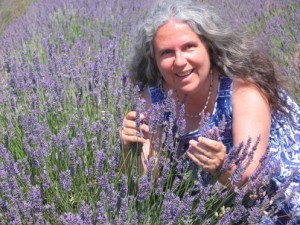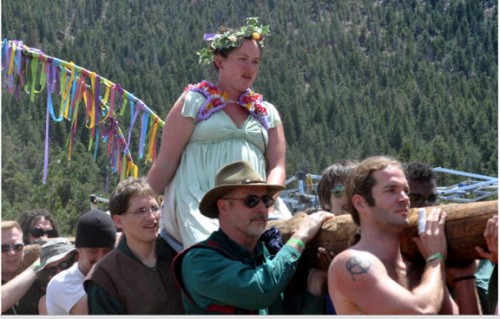Last week, I reported on the Atlanta Pagan community’s wreath project. As explained, the wreath’s purpose is to build a sense of solidarity for that Pagan community. Following the post, several readers launched into a discussion that probed the very nature and meaning of Pagan solidarity. As one reader asked, “What is the purpose?”
Additionally, readers explored the concept of solitary solidarity. Can such a thing exist? Or, as one reader put it, is the concept of the solitary group “oxymoronic?”
These are serious sociological questions that, in exploring, could help to define modern Pagan practice as it expands and diversifies. These age-old questions are very difficult to answer for a non-dogmatic, non-centralized religious group. But we may now have reached a point at which it is very necessary to confront them.
I opened the conversation up to the greater Pagan community, asking a variety of people their thoughts on the subject. I will share the responses in two parts. This week, in part one, we will examine the question of Pagan solidarity itself and, subsequently, how it relates to the solitary practitioner. Next week, in part two, we will explore the Pagan institution, its viability and purpose.
On the importance of Pagan solidarity:

Ginger Wood
Nature-based religions have been in practice for thousands of years. Nature religions will continue with or without “Pagan solidarity.” However, in a political sense… it is important that Pagans stand together when the need arises. – Ginger Wood, National First Officer of Covenant of the Goddess, Priestess of Gryphon Song Clan and Pagan novelist

Christine Hoff Kraemer
Pagan community solidarity is incredibly important. We don’t have to practice together or hold exactly the same beliefs to defend each other’s rights. – Christine Hoff Kraemer, Managing Editor at Patheos Pagan Channel, Cherry Hill Seminary Instructor
Without question, all of those who responded agreed that solidarity within the Pagan community is essential to facilitating growth and acceptance. As Rev. Selena Fox, Senior Minister at Circle Sanctuary, said, “When Pagans unite in Solidarity for a common cause; a synergy emerges that enhances our work together.”

Selena Fox
However, Chas Clifton, editor of The Pomegranate: The International Journal of Pagan Studies and a practitioner of American Eclectic Craft, pointed out that we need to better define the terms “community” and “solidarity.” He writes:

Chas Clifton (center)
We often say “community,” but what we really mean is “network” or “association.” Right now, what we mainly have are networks — or subcultures that you can join or leave, participate in or not, according to your individual desires. We may be moving toward community but I don’t think we are quite there yet.
He continues on to question the definition of solidarity which he labels “tricky.”
Does it simply refer to religious freedom under the broadest umbrella, like you are a Druid, and I am a rootworker, but I respect you as a Pagan practitioner, and you respect me? Or does it mean that I have to support everything that you do and all your struggles, like union workers not crossing each other’s picket lines?
Perhaps we can meld the two definitions. Solidarity would then become the outward respect that binds our network, or our community, together with the potential of offering support. If we omit terms like “have to” and “must” from “solidarity,” we are left with the strength of possibility and freedom.
On Solitary Solidarity:
Where does that leave solitaries, those that choose to practice alone? If they seek out community, do they jeopardize their solitary status? To repeat one reader’s words, are solitary community-groups “oxymoronic?” Can there be such a thing as “solitary solidarity?”

Lady Charissa
Solitaries are no different than any other Pagan. We all need strength in numbers to help protect our rights. Many solitaries like to come together, every once in a while, to socialize, share knowledge and celebrate our holy days. – Lady Charissa, founder of North Georgia Solitaries, coordinator of the Pagan Assistance Fund, High Priestess of Silver Pine Grove
Holli S. Emore
I don’t see solitary spiritual practice as precluding community solidarity. Solidarity is the practice of supporting and helping each other, not necessarily agreeing with each other. Solitaries benefit from the published teachings and public events put on by those affiliated with groups. We are interdependent, no matter how we define our practice. – Holli S. Emore, executive director of Cherry Hill Seminary, Priestess of Temple Osireion
Most agree that “solidarity” doesn’t end where “solitary” begins.
M Macha Nightmare
One need not belong to a formal religious group in order to identify with, and participate in, larger Pagan efforts any more than one needs to belong to a particular political party to vote. – M. Macha Nightmare, Priestess, Witch, teacher, ritualist and author.
Jonathon S. Lowe
Nobody loses their solitary practice or identity in the process of taking part in solidarity… The defining point of being a solitary practitioner isn’t to make yourself a hermit every time you practice. It is so that you can develop your own working spiritual system that is right for you, without having others interfere. – Rev. Jonathon S. Lowe, Shaman, Coordinator of The Atlanta Pagan Marketplace of Ideas
Most of the people that responded were in some way involved with or directly engaging the Pagan “network.” In the interest of perspective, I sought out a Pagan who chooses the true solitary experience. Stevie Diamond has never practiced within a group or been formally initiated, nor does she have the desire.
After hearing the questions, she echoed what Ginger Wood said, “Nature religions will continue with or without Pagan solidarity.” Stevie explained, “I am a quiet, reclusive person. It feels more personal and electric if I do a ritual or spell by myself. I just can’t imagine chanting in front of someone else.”
Despite this choice, Stevie acknowledges the benefit of having a Pagan network. It was through another witch that she identified her spiritual path. She has grown her own practice from books written by Pagan authors. And, if she encounters problems, she stated, “I would feel comfort in a group knowing they believe what I do.”
Next week, in part two, we’ll examine the Pagan institution. Is solidarity the birth-mother of the institution? And where does that lead?
(Note: I will post links to the full, unedited comments next week)
The Wild Hunt is not responsible for links to external content.
To join a conversation on this post:
Visit our The Wild Hunt subreddit! Point your favorite browser to https://www.reddit.com/r/The_Wild_Hunt_News/, then click “JOIN”. Make sure to click the bell, too, to be notified of new articles posted to our subreddit.



I think this is a glorious statement. As a worker toward common communication, I agree with Chas Clifton we are really a series of networks that cross and interlock in a number of ways. We are a network of Silo’s with vertical and horizontal decision making. It is within those we have given influence and permission to to act in solidarity, but must risk losing influence if they choose wrongly. The thing we have yet to build to allow for solidarity is what will we all support continually. Without even that simple consensus, we can not even begin to discuss community and solidarity.
I am still unsure how ‘Pagan solidarity’ can exist when people can’t even agree on what ‘Pagan’, as a term, encompasses.
It encompasses any spiritual system. As far as I’m concerned.
If you call yourself pagan then you are.
Used to be that Hindus and First Nations peoples were called Pagans for their (non-Abrahamic) beliefs.
Nowadays, I hear that a far few of the adherents of those paths take umbrage at the term being applied to them.
Further, your system allows Christians to be labelled ‘Pagan’.
If everyone religious is ‘Pagan’, why use ‘Pagan’ and not simply ‘religious’ as a descriptor?
A pagan and a Pagan are not the same thing. One is a term previously used by the dominant culture to describe indigenous religions; the other describes an (admittedly ad hoc) group of modern spiritual systems.
And yet I find people in the Pagan community arguing about whether to capitalise or not.
I think the key phrase in Mr.Harrington’s statement was “call yourself”. I know very few Christians who refer to themselves as pagan, but if any of them do so be it.
Which is fine until you try to organise anything.
My mind goes back to the Heathen argument – there are a fair few British/European Heathens that dislike the notion that their path is Pagan.
Some Hindus do see some commonalities, at least in terms of religious liberties and treatment by a sometimes intolerant Abrahamic majority.
I suspect that the Native American distaste for being associated in the pubic mind with Pagans is twofold: (1) the fact that we began as “dirty hippies,” and (b) the sense that because we are for the most part a New Religious Movement (as phenomena such as ours are known in the field of religious studies) we lack authenticity by virtue of being new and “made up.” Of course, all religions are cultural expressions that are “made up.”
In the case of recon pagan faiths what we do is not new or made up . Reconstructed means going back and finding what was lost when our native beliefs were displaced by Christianity. CRP and other forms of recon paganism do have authenticity , are culturaly based . Not made up , per se.such beliefs don’t fall into that category or started out as new age ” hippie stuff “. I suspect Native Americans would have an easier time dealing w/ Recons or Heathens as our beliefs are quite simular and Recons/Heathens have the same opinion about cultural appropriation as they do as well.We all find it to be an abomination .
Uh, where to you think those religions that recons are reconstructing came from? Humans created them. All religions are cultural expressions of humans.
Any religion that ‘works’ for its practitioners (even if there is only one) is authentic.
Cultural appropriation is a bugaboo I don’t have time to get into, but have opinions about.
If I go to an Indian restaurant and enjoy the pakoras, and then I go home and recreate them in my kitchen, am I appropriating their culture? (Just a rhetorical question to provoke thought.)
I’d answer your rhetorical question with a ‘yes’.
Of course, I can also counter with ‘is that necessarily a bad thing’?
No, generaly what is meant by appropriation is using things directly from another cultures religious beliefs , as in Native American Sweat Lodges , Tribal Dances etc . Or Using a Celtic Goddess out of context w/o properly researching her , what her aspects are etc . Like say using The Morrighann as a mother Godess. One must be very careful when using thinngs from a culture other than your own , i generaly don’t recomend it . In most cases the Culture it belongs to won’t be very happy , like the Native Americans or in my case CR’s .Foods are one thing , i don’t particularly care if you make a Guiness Stew , but improperly use, or even use w/o being of a Celt faith my Gods that i take exception to.For example a Wiccan using a Celtic Godess. That within their faith is ok , but not so much with us of a Celtic faith , Heathens feel the same way .
Also what i meant about recon faiths being culturaly/ethnicly authentic was coming from a specific place and ancient people , not new as in many new age beliefs that did come from so called “hippie stuff ” from the 1960’s.
“New Age” is neither new nor originally “hippie stuff.” A lot of Hindu and Buddhist material settled into the US for about a century and got popular, including with hippies, in the Sixties.
That is why i said so called ” hippie stuff” from the 60’s .I well understand the history of Wicca and other so called new age beliefs , most of it is based on quite old , old world beliefs , Hindu, Buddist etc..
but also alot on Cerimonial magic, and Jungian principles as well that could be considered ” New Age “.
Come now. In the 1950s, 1960s and 1970s, before Celtic Reconstructionism got underway, Wiccans and Druids were almost the only people on the planet giving honor, devotion, worship and offerings to Celtic gods and goddesses, and instructing their students to become acquainted with these deities in order to do the same.
Do you think the Celtic deities were or are offended at receiving recognition and mana from witches, after centuries of neglect, simply because witches also devote themselves to the deities of other cultures? Do you think that witches don’t know how to make a pleasing offering to Brigid or Hou?
For that matter, are you objecting to practitioners of Voudoun recognizing Maman Brigitte as one of their loa?
Organized cults (I’m using the word in the academic, non-pejorative sense) have every right to treat their rituals, their relationships with the entities they engage with, and the knowledge they acquire from interacting with other beings, as proprietary lore. No cult has the right to be the gatekeeper for every person who wishes to approach those beings, and no cult has the ability either, because human beings do not own the gods and They will do as They will.
The biggest problem w/ Cultural Appropriation is many that do it donot do the proper research and use the god or godess improperly , or out of context . Or use a ritual improperly or unsafely , that new age guru out in the western US for example ran unsafe sweat lodges , people died . This happened in the last year i believe .In many cases using a God/Godess improperly w/o the proper knowledge and respect can be detrimental .Within my own pantheon i only use or speak to a God until after i have done the proper research , know all thier aspects and use the proper respect . My take on this is its best not to wonder outside your own beliefs when dealing with gods and rituals , doing so can be dangerous .For example i would only partake in a American Indian sweatlodge w/ Native Americans and only if invited to do so and understanding what i was doing and what to expect , and only if well supervised in that my own and others involved well being was taken into account . no overexposure etc.And on the point of Celtic Gods receiving recogition i also believe the Gods would appreciate being treated properly as our ancestors did , and as Celtic recons do .I don’t think anyone has the right to use a God/Godess as they choose or any way they want to . The Gods deserve to be loved and treated as they were intended to by their origonal followers .A god is not a tool , to
be used as needed or misused . Proper knowledge, care , and respect is needed when dealing with any God.
You are correct no one can own a god , but a people can belong to a set of gods . In the case of the Celts we believe we are distant relatives of our gods , in that our gods created the Celtic people so in essence we belong to them . They are of us and we of them so we[ the Celts ]have an intimate relationship with our gods outsiders cannot understand . How we interact and deal with our gods is based on that relationship .Many native peoples or those practicing a native ethnic religion[recons] have this have this kind of relationship with thier gods .Something an outsider cannot understand, and as i’m sure you know , most recons have ethnic ties to to the faiths they follow . And most at least modern Druids are dedicated to a a particular pantheon , funtioning basicaly as a CR.or other type of recon .This is the case with ADF , from my understanding most Druid organisations function in the same manner.
Jews have been arguing for centuries about who is a Jew, whether Jews are a people, a nation, a culture, adherents of a religion, all or some of the preceding. We also disagree about whether we should act in solidarity with those who are treated as Jews by non-Jews even when they don’t consider themselves to be Jews or they wouldn’t be counted as Jews by the standards of some other Jews.
This goes on _all_the_time_, when Jews in Victorian England converted to CofE in order to have political careers, when Nazi laws counted anyone with one Jewish grandparent as a Jew, when an atheist Marxist who eats ham sandwiches on Yom Kippur says he is a Jew, when sixteenth generation descendants of victims of the Inquisition in New Mexico discover they have Jewish blood and want to be Jews again, when members of an African tribe whose form of Judaism predates the written Torah want to become Israeli citizens under the Right of Return, when the Israeli rabbinate refuses to recognize someone’s conversion because it was performed by a non-Orthodox American rabbi.
If Jews waited until all the boundary issues were settled before we acted in solidarity with each other, there would be no living Jewish religion and probably no living Jews.
Why act in solidarity with only ‘Paganism’? Surely ‘Pagans’ can act in solidarity with Jews? Both know the effects of discrimination and persecution, after all.
Why stop there? Why can’t all religions act in solidarity to prevent discrimination and persecution?
Actually, those of us Pagans who work in interfaith endeavors do exactly that, Leoht Sceadusawol.
Obviously, that being the key work of interfaith dialogue, I assume.
That reinforces my point, though. Why have ‘Pagan solidarity’ rather than ‘religious solidarity’?
Because in interfaith work, one represents a religion (or group of religions, or a religious group that’s not a church, such as a retreat center or a religious charity or a seminary).
There is no one kind of Christian. As Deborah Bender so compellingly explains, there is no universal agreement on who’s a Jew. Same with Native Americans: there are some huge court cases involving determination of who a member of a particular tribe and who isn’t.
Many people, myself included, feel it’s important to be comfortable and proud of their religious identity. Working in interfaith fosters interfaith understanding and tolerance. In many circumstances, religions are at odds with or compete with one another for members. Respectful interfaith dialogue minimizes this sense of competition and dispels ignorance of others’ beliefs and practices, thus fostering solidarity.
Religious solidarity implies that we all think the same (or close enough to the same for it not to make a difference), whereas interfaith solidarity reinforces our unity in valuing religious freedom and choice without compromising the uniquenesses of our individual and group religious identifications and pursuits.
Where do you draw the line between interfaith and intrafaith?
There isn’t really a hard line. Generally I consider intrafaith to be dialogue under the broad umbrella of Paganism, including Pagan-ish religions such as the Recons and Heathens who often don’t consider themselves to be Pagan. I consider interfaith to be dialogue among any and all religions.
Maybe it is time to start considering the different ‘Pagan’ paths distinct enough to qualify as being interfaith?
After all, is there really that much more similarity between Wicca and Ásatrú (for example) than between wither of them and Christianity or Buddhism?
I know a lawyer who did such a passionate, excellent job defending a minority religious’ person’s rights (G-d bless him) partly because infringement on such things offended him so deeply as a Jew. Just saying so – because it’s not not only not far-fetched but has happened.
Kinda reinforces my point, doesn’t it? Solidarity of religion doesn’t need to just come from the same religious path.
This action is quite typical of American Jews (perhaps of Jews in other countries as well). Jews were very supportive of the Civil Rights Movement on every level, financially, legally, politically, and risking their own lives. I donate to the ACLU and the Southern Poverty Law Center, as did my father before me. Jews tend to be supporters and activists in movements for economic and social justice. Not all Jews, of course, but a larger proportion than many other ethnic and religious groups. Reform Judaism places a lot of emphasis on the social justice message of the Hebrew prophets.
Ironically, the phenomenon in recent decades of Jewish neoconservatives and reactionary Jewish multimillionaires is a sign of Jews being accepted into American society and treated like everybody else, so they start behaving like everybody else. IMHO.
That would be an apt comparison, if not for the fact that “Jewish” has consistently, positively, meant all those things. All those descriptions define what being Jewish *is*. The only consistent definition of “pagan” has been “not a Christian”; this is a negative definition, defining a thing or idea by what it is not.
Jews are normatively endogamous; pagans are not. The criteria that pagans use to define themselves as a group are going to be different than the ones that Jews use. My point was that solidarity comes from recognizing that the commonalities override the differences when common interests exist.
One thing that pagans can learn from the experiences of Jews and African Americans is that it’s relatively easy to experience yourselves as a group and to see the need for solidarity when the group is being defined by hostile outsiders who need to be defended against. When group identity is not the first thing that outsiders notice about its members, and members of the group have the same freedom and opportunities as everyone else, solidarity is not reinforced by outside pressure and individual identification with the group is likely to be weaker. Pagans didn’t start thinking of themselves as pagans until the rise of Christianity in the Roman Empire.
IMHO Chas Clifton asks a key question. What is the extent of our mutual support for one another’s actions under the rubric of solidarity? My own sense of it goes as far as support of one another’s religious liberty, ie acting as though the First Amendment not only means what it says but guides our responses to events outside our borders. (I’m not be chauvinistic here so much as simplifying the concept.) But his analogy with union members not crossing other unions’ picket lines is somewhat stronger than that.
As solitary eclectic practioner myself i am aware of the fear of being labeled and/or glued to other peoples beliefs, but that is why we need communtiy solidariry. This is why i call myself pagan because i can be tolerant of others. The old saying “united we stand” is even more important for us politically though. If we don’t stand up for each other no one else will. The pagan community should have the widest arms of any spiritual group and should be the least intolerant.
its bizarre to me that anyone would want the community to be exclusive instead of inclusive.
I consider this off-topic but there’s some people who try to use this: “The pagan community should have the widest arms of any spiritual group and should be the least intolerant” to mean everything some do – to others – including against their will – shouldn’t be called out fiercely. I think most groups and many people have come to a place in their maturity where they’ve learned discernment is an important tool. ‘Discernment’ could get inaccurately called ‘intolerance’ if someone objects to anyone having boundaries, limits, expectations that must be met, etc.
I don’t know who is insulting you personally or excluding you. I have no problem with you choosing to be learning and work alone, I don’t even care.
Is “solitary” > “group” far as image/status so that people worry about their status being” jeopardized” and therefore call themselves “solitaries” even though they work with other people?
Well i tend to agree with Chas Clifton , we are more a group of networks . And as the community is now , that is the best that can be expected . But in all reality we need to learn to play and work well together before we can network with out side groups .There are enough simularities for us to put our differences aside , and work together for our common good .There are plenty of issues that effect all of us , there is strenth is numbers . Coalisions of our networks can allow us to exert more political pressure as a large united front than our small groups can do on thier own. The united groups that resolved the Pentagram issue for Pagan Soldiers in Veterans cemetaries is an example of what we can do when we work together .In the Stewart case the mighty V.A. under the Bush administration had to deal with us , this does work even under adverse conditions .Our Constitutional rights are worth fighting for , NO ONE else will do this for us .We must stand united for own rights , Solitaries and group members , covens , groves , larger groups such as ADF, Coven of the Goddess etc. Kilm
The pentagram is not representative of all traditions, though, is it?
True , it’s not even representative of my own beliefs , but that wasn’t my point. My point was in using that as an example of how multiple pagan entities can work together torwards and accomplish a common goal . In an ideal world the V.A. would recognised multiple pagan emblems/symbols . I’m not sure this is the case as of yet , there shouldn’t even be an issue w/ this at all .Can at times be fun being in a minority religion here in the good ole USA and elsewhere for that matter. Kilm
Perhaps more could be achieved by all religions working together to attain the right for individual symbology on headstones, even if it may seem abhorrent to some.
Neither is a forest nor “country cottage”, yet more pagan community sites, fora, etc…, use those in the header image than not.
Somewhat saddening, really.
Solitaries are folks who work alone. Solitaries don’t necessarily oppose groups – it just means they’re not part of them.
“Morally, you should be out and fight with us” under not-so-subtle rewording some are making, is not my attitude about solitaries. That’s kind of none of my business.
Misusing a simple term like “solitary” which means “alone” is acceptable because calling out stupidity is NOT
“If they seek out community, do they jeopardize their solitary status”
Jeopardizing – ?
Is there some harm to a person’s status/reputation (among presumably no one, if solitary) if someone should meet up and talk with someone else and therefore no longer be entirely working their path and learning alone?
i would say no . a social or political gathering has nothing to do with personal religious practice .
Pagan Pride Day is a religious fellowship/presentation day. Pagan meet-ups are religious fellowship in purpose. ‘Solitary’ has a simple definition. Solitaries aren’t part of group religious fellowships.
Are these comments clearer to you?
It’s not just Pagans that attend Pride days, is it? (In much the same way that it some heterosexuals will be supportive of Gay Pride.)
Are you serious? Since when has PPD been anything more than social? It’s certainly not “fellowship”, in the same way that “Christian fellowships” are.
Are you rude with that question? (Yes.) But that being said -“Pancake Suppers” aren’t even religion representative (unlike PPD) and are still considered “fellowship”. Yes, some non-involved show up, too, but they’re going to support those who are.
Is being solitary some status people should really fear losing, like does it hurt someone’s reputation in some way to admit they like fellowship within their religion? Because the responses suggesting a sense of jeopardy and worry about they’re not being solitary (even though they aren’t )suggests as much. And that’s what’s bizarre.
Err… If the concept is “oxymoronic”, possessing the qualities of an oxymoron (being a descriptive statement that possesses apparently contradictory terms, such as “jumbo shrimp”, or “the wisdom of fools”), that doesn’t make it impossible. Even if we are to assume “a group of solitaires” can be an adequate description, it’s the phrase that’s an oxymoron because of the fact that, under any other circumstances, “solitary” implies “without a group”, yet in the specific instance discussed, it makes sense. Just like how shrimp can be, relative to the size of other species of shrimp, be “jumbo”, even though the common name is also an expression for something very small, and just like how the simple nonsense and unselfconsciousness of a fool can seem rather wise, and indeed, is a long-held religious archetype.
So, you basically asked, “Can a group of solitaries exist, or can it exist yet seem contradictory at first glance?” Either way, the question, as written, assumes it can exist. Granted, there’s no reason it shouldn’t be assumed to exist, and maybe this is just my ignorance from a lack of experience (as a Hellenist, there is only Oikos [household] practise, polis [community], and cult [to specific deities and / or mysteries] practise, and it’s assumed that, given access to community, that just about everybody does some amount of the former two, and cult is only an “as you like it” sort of thing), but a group of solitaries is something I just assumed was a thing. That the concept of solitary practise means that people normally do their own thing out of personal preference –sometimes solitaries take part in open group rit at things like Pagan Pride Day and whatnot, but, being solitary, it’s not a mandatory thing.
And even those of us that belong to groups, groves , covens etc , do have daily solitary practices . Our everyday or daily observances that are part of our religious practices, prayers etc. And as most of us started out solitary we understand what solitary practice is . As you have stated solitaries do form into informal groups from time to time always have. Tis nothing to fear or worry about , just by doing so doesn’t change ones status as a solitary
“Tis nothing to fear or worry about , just by doing so doesn’t change ones status as a solitary”
Best to reassure them with this lie because some “worries” or “fears” their “status” gets lowered/jeopardized if they admit they work with groups? That’s the implication given. People who work with groups aren’t solitaries, unless by your argument everybody is one because they all probably do work at times on their lonesome as well.
quest , i don’t understand your point , why is sometimes coming together in informal small groups as say a meet up , or pagan social gathering threatening to a solitaries status , or even working w/ a small or even larger group for political reasons .These social or political groups have nothing to do w/ religious practice or how one does thier own practice .How is that a lie , i’m not sure what your getting at ?Wasn’t even close to what i was saying or implying
i myself attend a local monthly pagan meetup , and our yearly local Pagan Pride Day mostly attended by Wiccans . That in itself doesn’t make me any less a CRP . the same appies to a Solitary
Kilmrnock I don’t agree that your examples parallel.
CRP’s are probably not defined as avoiding groups of Wiccans. Solitaries are defined as alone.
Also all the feeling “jeopardized” and the “worry” and “fear” about “status” loss being expressed in all these threads is quite interesting and might bear a closer look – like perhaps about which “statuses” are seen as better, and a person’s insecurity.okay